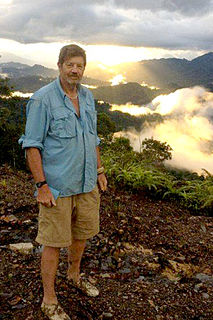A Quote by Alex Shoumatoff
The global climate is a complex interactive system, with all kinds of nonlinear feedback loops.
Related Quotes
The plumbing and pluvial dynamics of the Amazon, the largest freshwater system on Earth, are still far from understood. This is partly because it is a semi-open system. Moisture flows in and out unpredictably. A lot of nonlinear feedback loops and 'remote influences' - continental, transcontinental, oceanic, meteorological - come into play.
Today the network of relationships linking the human race to itself and to the rest of the biosphere is so complex that all aspects affect all others to an extraordinary degree. Someone should be studying the whole system, however crudely that has to be done, because no gluing together of partial studies of a complex nonlinear system can give a good idea of the behavior of the whole.
Knitting is formed by a series of loops pulled through loops to the end of time or to 'desired length'. By picking up loops and working in the opposite direction you are really picking up the concavities between the loops, and it is sheer unexpected witchcraft that stocking stitch and garter stitch will permit such an anomaly. Be grateful for this and don't expect anymore.
But Australia faces additional regional and global challenges also crucial to our nation's future - climate change, questions of energy and food security, the rise of China and the rise of India. And we need a strong system of global and regional relationships and institutions to underpin stability.
In an ecological perspective, in other words, there are few accidents or anomalies, only outcomes based on system structure and dynamics. Climate change and glittering malls, Calcuttan poverty and sybaritic wealth, biotic impoverishment and economic growth, militarism and terrorism, global domination and utter vulnerability are not different things but manifestations of a single system.
The different policies reduce damages by only a modest amount. Indeed, one of the surprises is how little the policies affect the damages from global warming. The reasons are that, because there is so much inertia in the climate system and because the Protocol reduced the global temperature increase by only a fraction of a degree over the next century.
Attributing global climate change to human CO? production is akin to trying to diagnose an automotive problem by ignoring the engine (analogous to the Sun in the climate system) and the transmission (water vapour) and instead focusing entirely, not on one nut on a rear wheel (which would be analogous to total CO2) but on one thread on that nut, which represents the human contribution.
The United States is strongly committed to the IPCC process of international cooperation on global climate change. We consider it vital that the community of nations be drawn together in an orderly, disciplined, rational way to review the history of our global environment, to assess the potential for future climate change, and to develop effective programs. The state of the science, the social and economic impacts, and the appropriate strategies all are crucial components to a global resolution. The stakes here are very high; the consequences, very significant.
Many scales of climate change are in fact natural, from the slow tectonic scale, to the fast changes embedded within glacial and interglacial times, to the even more dramatic changes that characterize a switch from glacial to interglacial. So why worry about global warming, which is just one more scale of climate change? The problem is that global warming is essentially off the scale of normal in two ways: the rate at which this climate change is taking place, and how different the "new" climate is compared to what came before.





































